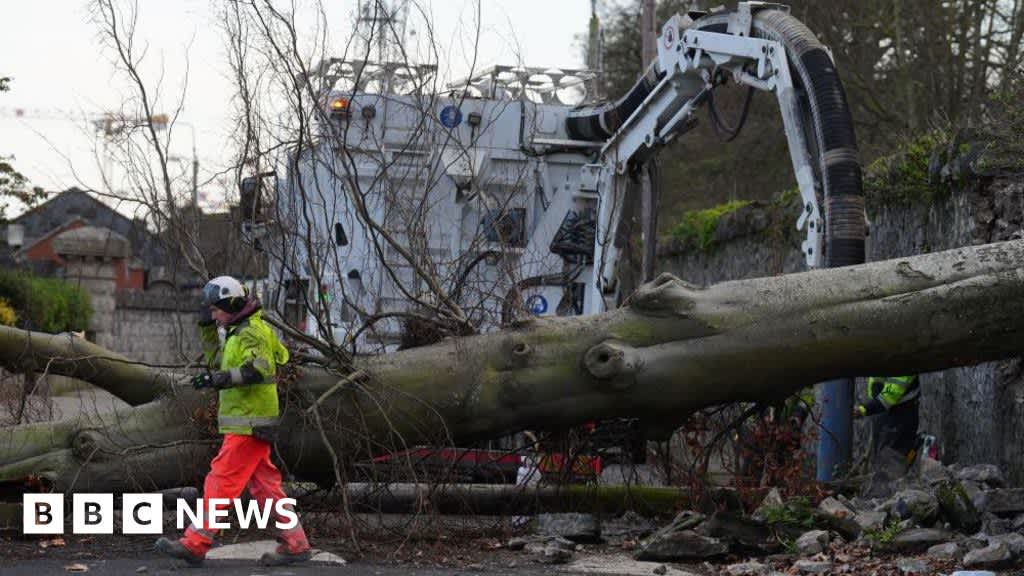Nearly one million properties are without power in the UK and Ireland and significant travel disruption continues after Storm Éowyn brought winds of up to 100 mph (161 km/h) on Friday.
One man died after a tree fell on a car in Ireland, while Scotland and Northern Ireland both saw widespread property damage as well as delays and cancellations to trains, planes, and ferries.
While the fiercest gusts have passed, strong winds are expected to continue, and parts of England and Wales could see up to 80mm of rainfall over the weekend.
An amber warning for wind is in force for much of Scotland, while yellow warnings for rain, wind, snow, and ice and in place for parts of southern England, Wales, and Northern Ireland.
In Ireland, 625,000 homes and businesses were still without power on Friday evening, and the country’s Electricity Supply Board said power would take a “significant number of days” to restore.
Around 138,000 people were without water, a figure Irish Water said was likely to increase because of power outages at treatment plants and pumping stations.
Some 214,000 properties in Northern Ireland, 106,000 in Scotland, and 20,000 in north-west England were also without power.
Northern Ireland Electricity said it could be up to 10 days before all those affected are reconnected.
Northern Irish Education Minister Paul Givan said 60 schools had reported “significant damage to some buildings” and that officials were working to establish which ones would be unable to open on Monday.
Despite the strongest winds having passed the storm is still expected to bring gusts of more than 80mph (128km/h) across the coast and hills of Scotland and Northern Ireland.
ScotRail said engineers would be working through the night on Friday to clear trees and other debris from tracks, but that there was “extensive damage to overhead lines” which would need to be repaired before trains could run.
It said services would continue to be “heavily impacted” on Saturday and that customers should not expect trains to operate before 12:00 GMT at the earliest.
Edinburgh Airport said it would still be operating under “challenging conditions” on Saturday and that the disruption on Friday would have knock-on impact on services over the next few days.
Glasgow and Belfast International said passengers should continue to check the latest travel information with their airline before travelling.
CalMac, the main operator of ferries off Scotland’s west coast, is still experiencing some disruption, although the majority of ferry crossings in the Irish Sea – including those by Irish Ferries and Stena Line, both of which had to cancel services on Friday – appear to be operating normally.
National Rail said winds and rain would affect some services in northern England into Saturday.
Passengers with Avanti West Coast are advised not to travel north of Preston, while those with LNER are advised not to travel north of York.
Mark Jones, who lives in Coldingham in the Scottish Borders, described Storm Éowyn hitting his area like “an earthquake”.
On Friday morning, he saw his corrugated iron carport being lifted out of the ground and tipped into an area of woodland.
“I didn’t feel seriously alarmed because there was about 30ft between me and the carport and it just lifted up quite steadily and tilted over,” he recalled.
“I just think the word ‘storm’ is too mild for what we have witnessed here. Only a hurricane could do that.”
Liam Downs, an electrician from Cardross on the north side of the Firth of Clyde, has been driving up and down the coast helping the local community, including removing trees from the road.
While going to check on a client in nearby Rosneath, he saw “about 10 trees” fall within the space of 10 minutes which “completely blocked us in the one-way road”.
“As we were driving along the coast earlier, waves were coming up onto the road and my van literally went from being in the right lane to being up on the curb,” he said, adding: “Thankfully, we’re in quite a big van”.
Seven UK warnings remain in place:
Source: www.bbc.com
